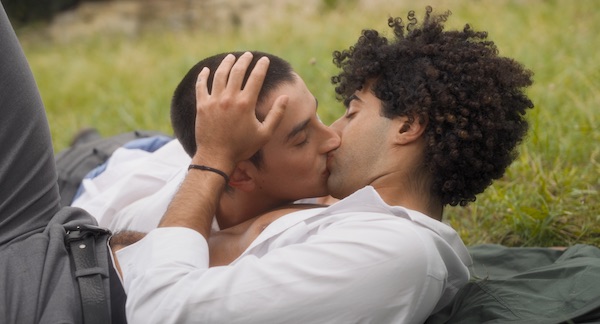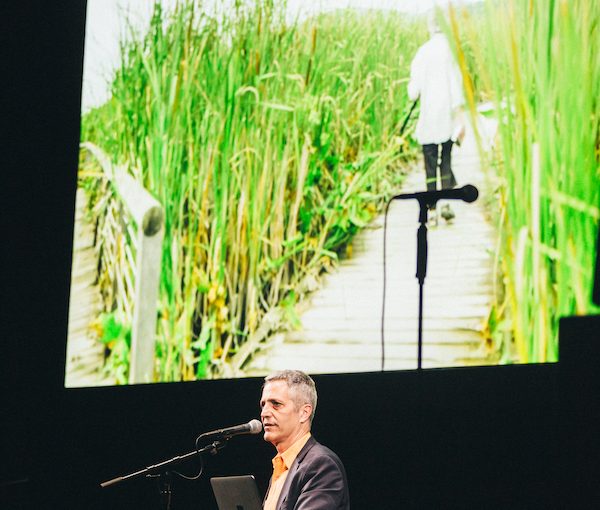Filmmaker Sam Green will narrate live his documentary 32 Sounds, which is part of the Vancouver International Film Festival. (photo by Catalina Kulczar)
“There’s a thing in documentary filmmaking where, after you’ve done an interview with someone, you need to get what’s called room tone,” shares director, writer and editor Sam Green in his film 32 Sounds. “Room tone,” he explains, “is basically just sitting still for about 30 seconds or so and recording the sound of the room; this can help out a lot with editing later. I’ve been making films, which is kind of just marveling at people in the world, for 25 years now, and there’s always something odd and wonderful about this moment. An interview takes a person to other times and places and, now, they’re just here in the present, sitting with the sound of the room.”
Watching some of his interviewees, as they struggle or embrace sitting in silence for a few seconds, is one of the many highlights of Green’s latest documentary, 32 Sounds, which screens Oct. 5, 7 p.m., at the Vancouver Playhouse, as part of the Vancouver International Film Festival’s specialty program VIFF Live. New York-based Green will be in town to narrate the screening in-person, and audience members will be given headphones to wear, to help make the experience as immersive as possible.
The film premièred in January 2022 at the Sundance Film Festival. It exists in three forms: one as described above, but sometimes also with live music by composer JD Samson, who wrote original music for the film; another designed for an immersive at-home experience; and a theatre version without the in-person performance aspect. Watching the film at home without headphones was not ideal, but it was still enjoyable and mind-opening. There are parts where it would have added understanding and had greater impact to have heard something in only the left ear or only the right one.
32 Sounds is not just auditorily stunning but a visual pleasure, and intellectually stimulating, as well. Though there are explanations of how humans hear and how sound affects our bodies, the documentary is more philosophical than scientific. It presents concepts like the idea that all the sounds that have been made in the world should still be out there somewhere, “tiny ripples vibrating,” as contemplated by mathematician Charles Babbage, who is credited with having invented the computer, in the 1800s. If we had the right device, mused Babbage, we should be able to listen again to every joke, declaration of love or angry word ever uttered, narrates Green. “The air itself is one vast library, on whose pages are forever written all that man has ever said or woman whispered,” wrote Babbage in 1837.
In 2022, Green wrote: “I’ve made many documentary films over the years, and each one has changed me in some way, but none as much as the film I just recently finished called 32 Sounds. The film weaves together 32 different recordings as well as images, music by JD Samson, and voice-over to create a meditation on sound. Or, put a different way, the film uses sound to consider some of the basic features of our experience of being alive: time and time passing, loss, memory, connection with others, and the ephemeral beauty of the present moment.”
From the sound of a womb, to a cat purring, to fog horns, to a man who captures the sound of bombs landing nearby as he’s recording his music, Green masterfully takes viewers (listeners) on an emotional journey. We get to see how movie sound magic is made by foley artists like Joanna Fang. We meet sound and visual artist Christine Sun Kim, who talks about the deaf community, as well as hearing people’s perceptions of her work. Edgar Choueriri, professor of physics at Princeton, plays part of a tape he made for his future self when he was 11 years old. And we get to know a bit about composer and academic Annea Lockwood, 81 at the time of filming, who had been recording things like the sound of rivers for more than 50 years. Lockwood fundamentally changed how Green thinks about sound, especially a point she makes in the film: “There’s something I started writing about a year ago: listening with, as opposed to listening to,” she shares. “And it’s my sense that, if I’m standing here, I’m just one of many organisms that are listening with one another within this environment … we’re within it and we’re all listening together, as it were.”
32 Sounds has much to recommend it, including the chance to get up and dance, if you choose, when Green pumps up the volume on Sampson’s music, so you can “feel the sounds in your whole body.”
Accepting oneself

Sound that you can feel in your whole body plays an important part in the short film Cut by Samuel Lucas Allen. In what may – or may not – be semi-autobiographical, Cut tells the story of Daniel, a high school student who tries to hide his Jewishness and his queerness. At key moments, the original score created by Sam Weiss thrums with tension, underscoring Daniel’s inner conflict.
Despite being somewhat heavy-handed – there is nothing subtle in this film, perhaps because it is only 19 minutes long – Cut is interesting, well-acted and put together. It opens with a Chassidic man holding a rooster, then shows Daniel cutting his hair, which falls onto a copy of Merchant of Venice, from which the teen will eventually have to perform, by memory, Shylock’s “If you prick us, do we not bleed?” speech. Daniel’s room has drawn images of men on his walls, in various poses, apparently his own work.
The film defines its three main elements: kapparot, as a “Jewish ritual where a chicken is blessed and slaughtered in the place of a person, to atone for their sins”; tefillin as a “pair of leather boxes containing portions of the Torah, worn by Jewish men in their morning prayers”; and cut, “a slang term for circumcision, the surgical removal of the foreskin, usually performed for religious reasons.”
It is mainly the Jewish aspect that Allen deals with in this work. Daniel is able to walk away from a gay slur, but not an antisemitic one, and, in the end, he is reconciled to himself and his Orthodox father by the mystical Chassidic man’s performing kapparot over him. We witness Daniel’s acceptance of being Jewish, but are left to wonder if he comes to accept his queerness, an aspect of his being that conflicts with Orthodox Judaism, though his soul would still be considered divine in religious circles, even if he engages in homosexual acts, which are prohibited by the Torah.
Cut is featured in VIFF’s International Shorts: Nothing Comes Easy, a program for viewers aged 18+, in which the films’ “protagonists discover that sorting out their lives can be much more difficult to achieve than they realized.” It screens Oct. 5, 6:45 p.m., and Oct. 7, 12:15 p.m., at International Village 8.
The Vancouver International Film Festival runs Sept. 28-Oct. 8. For the full schedule and tickets, visit viff.org.

